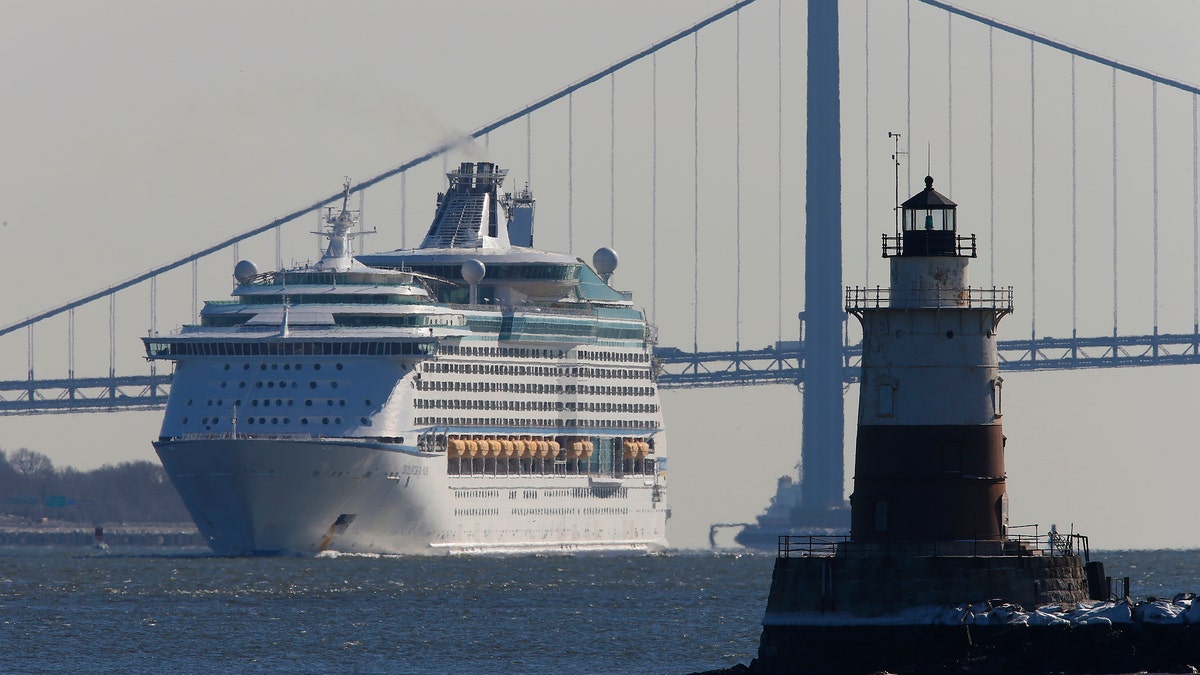
The Royal Caribbean's cruise ship Explorer of the Seas arrives back at Bayonne, New Jersey January 29, 2014. (REUTERS/Eduardo Munoz)
A second cruise ship was forced to cut its journey short this week, as Princess Cruises' Caribbean Princess ship returned to Houston on Thursday after nearly 200 passengers and crew members fell ill. Earlier this week, Royal Caribbean's Explorer of the Seas vessel was also forced to return to port after nearly 700 developed gastrointestinal illnesses – leading some to wonder whether it might be wise to stay on-land for their next vacation.
Though the Centers for Disease Control and Prevention (CDC) is investigating the outbreaks – which occurred on Royal Caribbean International and Princess Cruises– they said it would be premature to issue an advisory against cruise travel.
“Just because we’ve had two cruise ships with gastrointestinal illness… doesn’t mean there’s a problem with all cruise ships,” CDC press officer Bernadette Burden told FoxNews.com. “It’s not uncommon or unique to us, it’s just that this particular vessel garnered a lot of media attention but that wouldn’t cause us to say there’s something wrong with all cruise ships. Each ship is different, each cruise is different.”
Though tests are still confirming the cause of each outbreak, it’s suspected that norovirus – a highly contagious form of acute gastroenteritis – may be to blame.
“The predominant features [of norovirus] are nausea, vomiting and diarrhea, and about half will have fevers associated with a norovirus infection,” Dr. Amy Ray, infectious disease expert at University Hospitals Case Medical Center in Cleveland told FoxNews.com.
Norovirus, which can last from 24 hours to three days, is the most common cause of acute gastroenteritis in the United States and occurs more frequently in the winter months, according to Ray. The infection, which can cause severe dehydration, kills up to approximately 800 people each year in the United States and sickens a suspected 19 to 21 million.
The confined space of a cruise ships can be a ripe breeding ground for infections like norovirus, which can easily be transmitted through contaminated food or drink, or contact with infected persons.
“Risk factors would be eating commonly prepared food, by a certain staff of people who may unfortunately be infected and transmitting norovirus into the food if their hands are not clean or gloves are not worn,” Ray said. “Another risk factor is sharing public restrooms; restrooms on a cruise ship would have to be cleaned frequently and thoroughly with bleach.”
Despite the two incidences this week, the official trade organization of the cruise industry of North America - the Cruise Lines International Association (CLIA) - said historic rates of gastrointestinal illnesses on cruise ships are low.
“In 2013, there were seven norovirus outbreaks on cruise ships reported to the CDC, involving a total of 1,238 passengers. To put that into perspective, approximately 21.3 million passengers sailed on CLIA member cruise ships in 2013 so this figure represents approximately six one thousandths of one percent (.006%) of global passengers,” David Peikin, director of public affairs for CLIA, said in an email to FoxNews.com.
Furthermore, the CLIA said all of its members – which include both Royal Caribbean International and Princess Cruises - take steps to prevent passengers with illnesses like norovirus from boarding a ship and have protocols in place to prevent the spread of disease should an outbreak occur.
For passengers worried about upcoming cruise travel, the CDC advised people to visit their web site to research the health risks associated with cruises and educate themselves about how to avoid getting sick – and how individual cruise lines have performed in past inspections.
“If you are curious how well a particular ship has done in the past in terms of unannounced inspections, you can go into our website type in the cruise line and ship and it will bring this information up about the most recent inspections,” Burden said. “If you have knowledge that there was a recent outbreak of illness on a ship, you can search by year and find outbreaks that rise above the threshold where they must report illness to the CDC and you can learn more about what took place on that individual voyage.”
Furthermore, the CDC encourages people to call individual cruise lines to inquire about sanitary practices or any other questions they may have.
Ray said she would encourage cruise passengers to ask about food preparation and cleaning policies on ships, including how often public restrooms are cleaned and whether cruise lines have policies regarding the isolation of sick passengers. Additionally, passengers should always make sure there will be a physician on board, in addition to nursing staff.
But while people should be aware of the risks associated with cruises, they don’t necessarily need to avoid them altogether, according to Ray.
“I think it’s a risk but the number of outbreaks that occur when compared to the number of overall cruise line trips is very small,” Ray said. “The cruise lines have a vested interest in doing the best they can to prevent these kinds of occurrences.”
